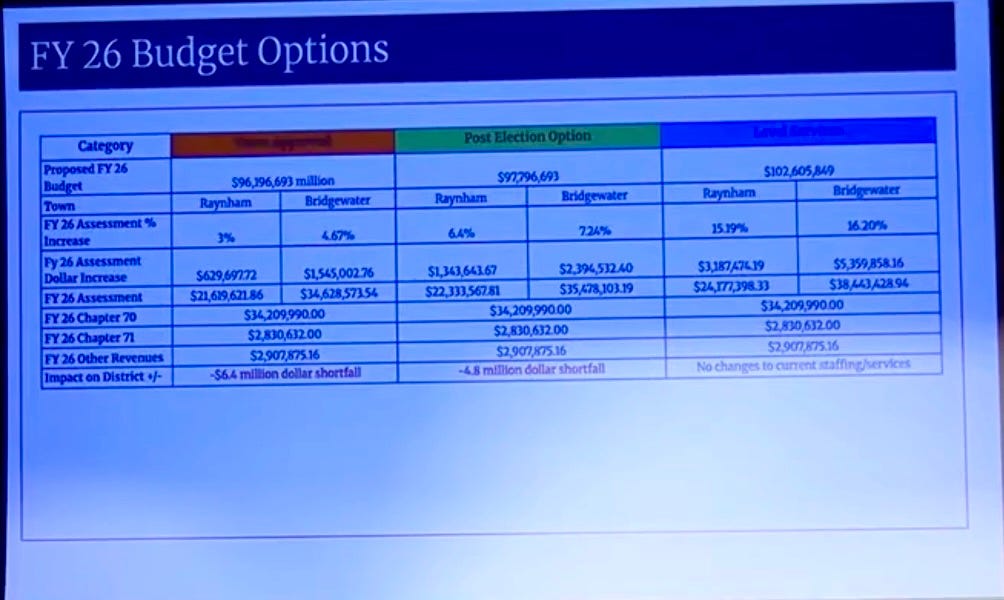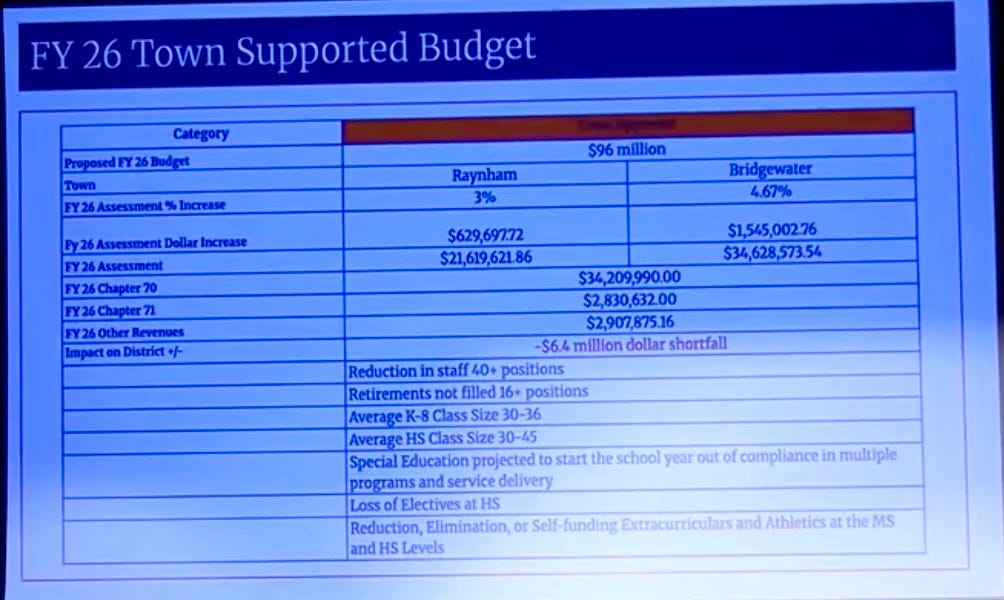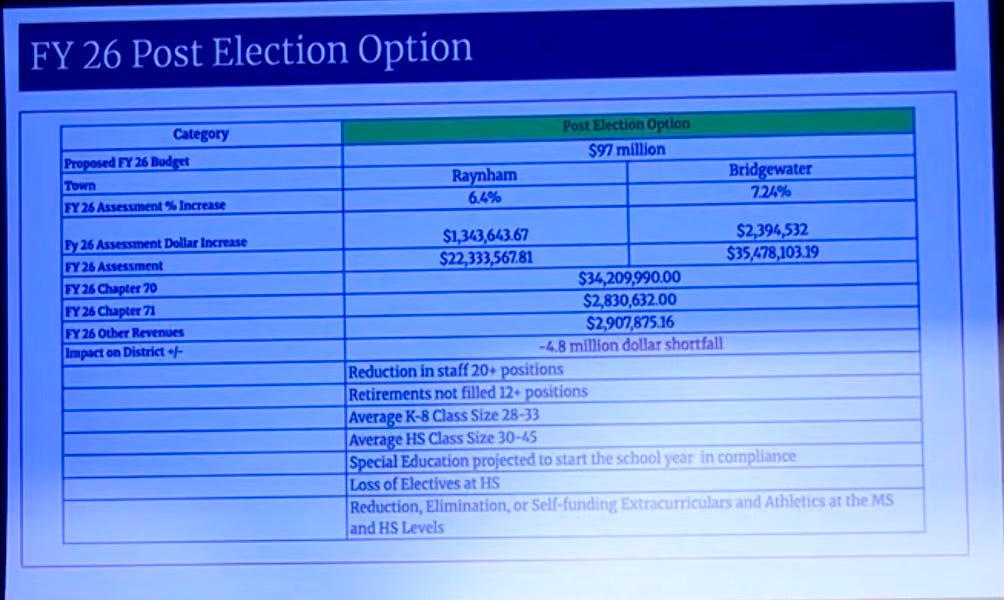School Committee Struggles to Reach Budget Agreement After Override Failures
Committee recesses meeting until Thursday after failing to secure six votes needed for amended $98.6 million budget proposal
RAYNHAM - June 26 - The Bridgewater-Raynham Regional School Committee recessed its special meeting Wednesday night without approving a fiscal year 2026 budget, following failed override votes in both towns earlier this week.
The committee needs six of eight members to approve any budget proposal but could not reach that threshold during the lengthy session that stretched past 10:30 p.m.
"I don't think we're going to get six," said Committee Chair Rachel King before the recess motion passed. The committee will reconvene Thursday at 7 p.m. to continue deliberations.
The meeting came after both Bridgewater and Raynham voters rejected Proposition 2-½ override questions on June 21 and June 24, respectively. The overrides would have funded a $106.2 million school budget.
Superintendent Ryan Powers presented three budget scenarios to the committee: a $96.2 million "town approved" budget matching what municipalities already committed, a $102.6 million "level services" budget, and a $97.8 million "post-election" option attempting to preserve some positions.
The town-approved budget would create a $6.4 million shortfall compared to level services, requiring the elimination of more than 40 positions across all areas including teaching, support staff, administration, and facilities.
"We are looking at, obviously, reduction in staff, 40 plus positions across the board," Powers said. "No area of the district was left untouched."
The post-election option would still result in significant cuts but preserve 21 teaching positions, reducing the shortfall to $4.8 million. However, it would still require towns to increase their assessments beyond what they previously approved, which could require another override vote.
"We're looking to continue making progress in that direction and with the proposed budget we're looking to really better meet our students' needs," said Losche.
The proposal would leave approximately $1.4 million in the district's reserve account, down from a projected $2.2 million balance.
Several committee members expressed concerns about depleting reserves and the sustainability of the approach.
"This is again money that doesn't come back and we're going to be in the same position next year," said Fitzgibbons. "We're basically putting a plastic band-aid on an arterial wound, but let's kick the can another year, why not?"
The committee successfully voted to modify the Post Election Option, but failed to pass that modified option. The amended budget proposal failed with five members (Davenport, Loshe, Hoy Thomas, Gouthro and Mainville) voting no, and three members (Fitzgibbons, Conrad-Laberinto and King) voting yes, falling short of the required six-member supermajority.
During public comment, several community members urged the committee to maintain its commitment to adequate funding despite the override failures.
"The outcome of the vote does not change what is right," said one parent who identified herself as a special education advocate. "We cannot fulfill our mission, and we cannot provide excellence in education for all to scale back, water things down, or accept good enough."
Another resident noted the district ranks as the seventh lowest funded school system in Massachusetts, placing 281st out of 288 regular school districts for per-pupil funding.
Committee members acknowledged the difficult position created by the override defeats while expressing frustration with the low voter turnout in both communities.
"Only a portion of the communities voted. A very small amount, maybe 30 percent of each community voted, which on a tax implication is outlandish to me," King said.
The committee faces a June 30 deadline to reconsider, amend or recertify its budget to the state Department of Elementary and Secondary Education. If no budget is certified by July 1, the state will implement a 1/12 budget based on the current year's funding with minimal increases.
Under state law, if the committee sends an amended budget to the towns and they disapprove it, the process would trigger a joint town meeting where voters from both communities would decide on funding.
Powers outlined potential cost savings already achieved, including a reduction in health insurance increases from 20 percent to 15 percent, saving approximately $507,000, and potential savings of up to $300,000 from contract negotiations.
However, these savings would be absorbed by the budget shortfall rather than providing additional resources.
The superintendent warned that the town-approved budget could leave the district out of compliance with special education requirements, noting the state Department of Elementary and Secondary Education intervened three times this past year after finding compliance issues.
"We're worried that we may start the school year out of compliance in multiple programs in terms of service delivery," Powers said.
The budget crisis reflects broader challenges facing the regional district, which serves students from both Bridgewater and Raynham. Powers noted the district typically gains about 100 new students annually, increasing costs while state and local funding fails to keep pace.
Committee members discussed the need for both towns to contribute additional resources beyond their initially approved assessments, though they cannot dictate how municipalities fund their obligations.
"We all need to share in this responsibility right now," King said. "Maybe they need to make cuts, maybe they need to take free cash. I think we all need to share some sort of burden."
The committee will resume deliberations Thursday evening, with the June 30 deadline approaching rapidly.
Watch the complete meeting courtesy of the Bridgewater Raynham School Committee.
This article was generated with artificial intelligence. Please contact us with any accuracy concerns.







